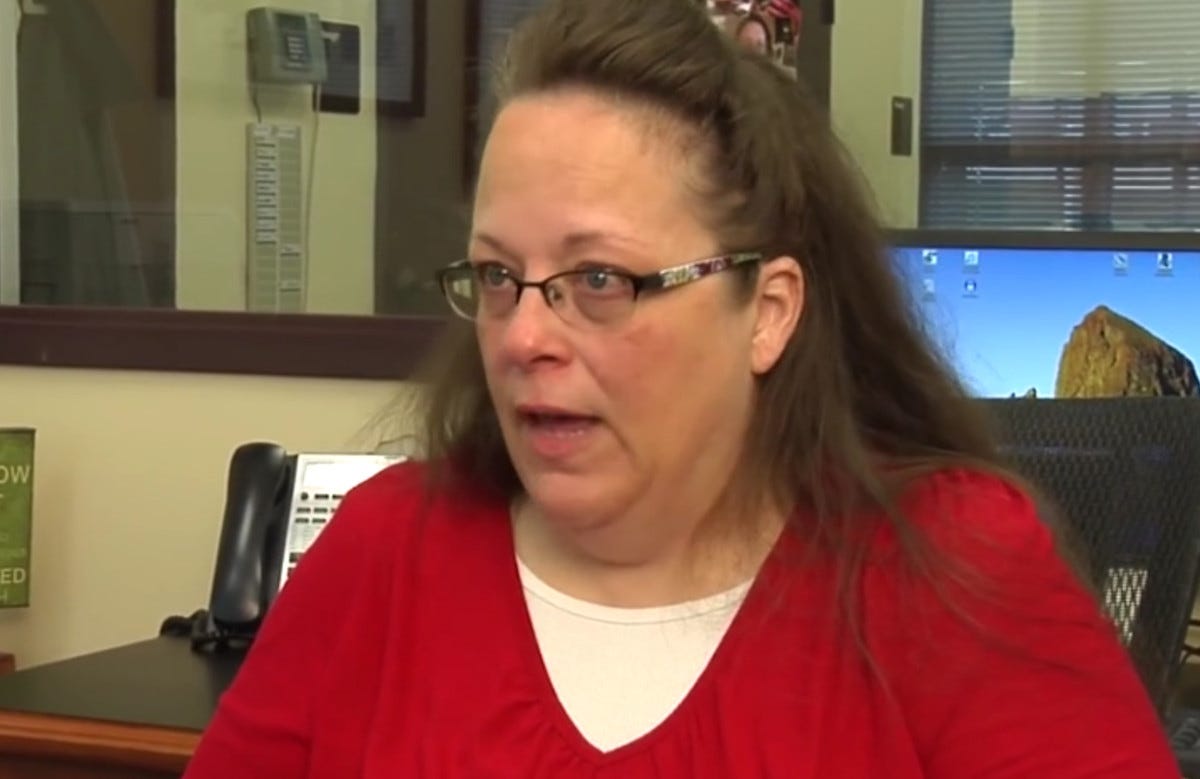Supreme Court rejects attempt by foe of gay marriage to overturn Obergefell decision
Justices also hear case of Rastafarian whose hair was forcefully cut in prison
In a pair of unrelated cases involving religious freedom, the U.S. Supreme Court today shut down an attempt to force reconsideration of its 2015 decision legalizing same-sex marriage nationwide and also spent about two hours hearing oral arguments in a dispute involving a Rastafarian whose hair was forcefully cut in a Louisiana prison in 2020.
The challenge to the Obergefell v. Hodges ruling came in the form an appeal of lower-level ruling awarding $100,000 to a male couple who had sued Kentucky county clerk Kim Davis for denying them a marriage license in 2015. Davis had appealed her loss to the Sixth U.S. Circuit Court of Appeals, where she lost again. Davis lost today when the high court issued a one-sentence decision not to consider her case: “The petition for a writ of certiorari is denied.”
It takes four of the nine Supreme Court justices to agree to accept a case for hearing. As is typical when the court decides not to hear a case, the ruling did not indicate whether any of the justices disagreed with that decision.
Davis had claimed that she could not be held personally liable for the denial of the marriage license because she had made her decision out of religious conviction. But the appeals court had found that “government officials are of course free to express their views and live according to their faith. But when an official wields state power against private citizens, her conscience must yield to the Constitution.”
Davis had also sought to overturn Obergefell itself as part of her case, although technically a court could have ruled in her favor on the issue of personal liability without reviewing Obergefell itself.
Questions raised about liability in Rastafarian’s case
Coincidentally, the other religious-freedom case addressed by the Supreme Court today, Landor v. Louisiana Department of Corrections, also involved personal liability of government employees for their actions in the scope of their work.
In that case, Damon Landor was a prisoner in the Louisiana prison system when prison guards forced him to have his hair cut in violation of his religious beliefs as a Rastafarian. Landor had sued the prison guards under the terms of the Religious Land Use and Institutionalized Persons Act (RLUIPA), which had been passed by Congress in part to protect the religious rights of inmates who are in prisons that receive federal funds.
There was no dispute in this case that Landor’s rights had been violated. As Justice Amy Coney Barrett noticed during today’s hearing, “The facts in this case are egregious.” The question was whether the prison employees involved in the unlawful haircut could be held personally liable for financial damages as a result.
Today’s oral arguments did not hinge on First Amendment issues involving freedom of religion but on interpretation of RLUIPA.
Landor’s attorney, Zachary D. Tripp, told the court that “this is an unusually easy case,” in part because there is a long tradition of holding many public officers, including prison guards, individually liable for violations of legal rights.
Libby A. Baird, an assistant to the U.S. solicitor general, told the court that the U.S. government agrees with Landor’s position. She said RLUIPA was passed to protect religious rights, and if prison employees can’t be sued for violations, “the government is not getting what it paid for.”
J. Benjamin Aguiñada, the Louisiana solicitor general, told the court that while Congress has the constitutional ability to make prison employees liable for damages in such cases, it did not explicitly do so in RLUIPA.
Justices asked rigorous questions of all three attorneys, and in a case that has no clear liberal/conservative divide, it was not clear in which direction most justices were leaning.
Justice Neil Gorsuch, however, said he was concerned about the lack of clarity in RLUIPA regarding liability.


